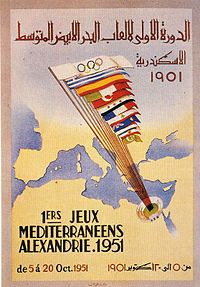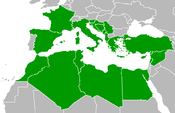- Mediterranean Games
-
Mediterranean Games 
Alexandria Mediterranean Games 1951
Flag of the gamesFirst event 1951, in Alexandria, Egypt Occur every four years Last event 2009, Pescara, Italy Purpose Sports for the Mediterranean President Mr. Amar Addadi (ALG) Website International Mediterranean Games Committee The Mediterranean Games are a multi-sport games held every four years, mainly for nations bordering the Mediterranean Sea, where Europe, Africa and Asia meet. The idea was proposed at the 1948 Summer Olympics by Muhammed Taher Pasha, chairman of the Egyptian Olympic Committee, and they were first held in 1951. The first 10 games took place always one year preceding the Olympics. However, from 1993 on, they were held the year following the Olympic games. The Games were inaugurated on October 1951, in Alexandria, Egypt, in honour of Muhammed Taher Pasha, the man to whom their inspiration is owed, with contests being held in 13 sports along with the participation of 734 athletes from 10 countries. Ever since, they take place every 4 years without any interruption. In 1955, in Barcelona, during the II Games, the set up was decided of a Supervisory and Controlling Body for the Games, a kind of Executive Committee. The decisions were finally materialized on June 16, 1961, and the said Body was named, upon a Greek notion, ICMG (International Committee for the Mediterranean Games).
Contents
Description
The Mediterranean Games present an opportunity for peaceful athletic competition between youth from different continents, cultures and religions — all bound together via a common Olympic Ideal, which has sprung from the ancient Mediterranean country of Greece, the cradle of contemporary western civilization. A chance is thus given, through these games, for young people to get to know each other, appreciate each other, reaffirm or strengthen their ties in a climate of genial rivalry.
The Mediterranean Games, in terms of the preparation and composition of the National Delegation, are held under the auspices of the International Olympic Committee and the Hellenic Olympic Committee (HOC). However, their establishment too must be credited to the HOC, for it held a leading part in their being founded despite all difficulties.
Athens is the permanent seat of the ICMG (irrespective of who the President might be) and the Committee’s General Secretary is Greek. This comes as a further tribute to Greece, highlighting its leading role with regard to the function and strengthening of the institution.
The logo of the games, also referred to as the "Mediterranean Olympics", is composed of three white rings symbolically representing Africa, Asia, and Europe — the three continents that border the Mediterranean Sea. This logo has been used since the Split games in 1979, for which it was devised and afterwards accepted for the whole Games. During the closing ceremony, the flag of the games is transferred to the country of the city chosen for the organisation of the next Mediterranean Games.
Participating countries
At present, 23 countries participate in the games:[1]
- Europe: Albania, Andorra, Bosnia and Herzegovina, Croatia, Cyprus, France, Greece, Italy, Malta, Monaco, Montenegro, San Marino, Serbia, Slovenia, Spain and Turkey
National Olympic Committees within the Olympic Movement bordering the Mediterranean Sea which are not permitted to participate are Israel and Palestine.
Allen Guttman in The Games Must Go On argued that Israel's exclusion is both antisemitic and politically motivated due to antagonism towards Israel by the participating Arab nations. The IOC's Avery Brundage was not supportive of Israel's desire to compete, saying: "I cannot understand why anyone wants to go where he is not wanted". The International Amateur Athletics Federation pushed the issue at the 1959 Mediterranean Games in Beirut by refusing to grant permission to hold an athletics competition unless Israel were allowed to compete. Lebanese games organiser Gabriel Gemayel conceded to this, but side-stepped the ruling by holding a parallel Lebanese Games comprising athletics events between the present nations alongside the official Mediterranean Games competitions.[2]
There are countries not bordering the Mediterranean Sea which nonetheless participate: Andorra, San Marino and Serbia.
The Hellenic Olympic Committee has suggested that nine more countries that do not satisfy geographic criteria to be allowed to participate, such as Bulgaria, Macedonia, Portugal and some Arab countries.[citation needed]
Flag
The symbol of the Mediterranean Games consists of three rings representing Asia, Africa and Europe, the three continents involved in this competition.[3] The rings dissolve in a wavy line in their lower part, as if they were immersed in the Mediterranean Sea. During the closing ceremony, the flag is transferred to the country of the city chosen to host the next Mediterranean Games.[3]
Host cities
No inland city has ever hosted the games. All but one of the host cities to date have been situated on the Mediterranean coast. (Casablanca is located on the Atlantic coast.) Recently, Dubrovnik (Croatia), Mostar (Bosnia and Herzegovina) and Kotor (Montenegro) signed an official Declaration for joint candidacy for hosting 2021 Mediterranean Games.
Below together the official numbers in sequence
No Year Host Participating
CountriesSports Competitions Athletes Total City Country Male Female I 1951 Alexandria  Egypt
Egypt10 14 91 734 --- 734 II 1955 Barcelona  Spain
Spain10 20 102 1.135 --- 1.135 III 1959 Beirut  Lebanon
Lebanon11 17 106 792 --- 792 IV 1963 Naples  Italy
Italy13 17 93 1.057 --- 1.057 V 1967 Tunis  Tunisia
Tunisia12 14 93 1.211 38 1.249 VI 1971 İzmir  Turkey
Turkey14 18 137 1.235 127 1.362 VII 1975 Algiers  Algeria
Algeria15 19 160 2.095 349 2.444 VIII 1979 Split  Yugoslavia (now Croatia)
Yugoslavia (now Croatia)14 26 192 2.009 399 2.408 IX 1983 Casablanca  Morocco
Morocco16 20 162 1.845 335 2.180 X 1987 Latakia  Syria
Syria18 19 162 1.845 335 2.180 XI 1991 Athens  Greece
Greece18 24 217 2.176 586 2.762 XII 1993 Languedoc-Roussillon  France
France20 24 217 1.994 604 2.598 XIII 1997 Bari  Italy
Italy21 27 234 2.999 804 3.803 XIV 2001 Tunis  Tunisia
Tunisia23[4] 23 230 2.002 1.039 3.041 XV 2005 Almería  Spain
Spain21 27 258 2,134 1,080 3,214 XVI 2009 Pescara  Italy
Italy23 28 XVII 2013 Mersin  Turkey
TurkeyXVIII 2017 Tarragona  Spain
SpainList of sports
There are Athletics, Field Athletics, Aquatics, Gymnastics, Table Tennis, Fencing, Archery, Bowling, Shooting, Cycling
All-time medal table 1951-2009
Rank Nation Gold Silver Bronze Total 1  Italy
Italy750 634 583 1967[5] 2  France
France579 524 447 1550[5] 3  Spain
Spain274 381 471 1126[5] 4  Turkey
Turkey263 171 203 637[5] 5  Yugoslavia
Yugoslavia199 177 182 558[5] 6  Greece
Greece165 215 291 671[5] 7  Egypt
Egypt103 161 191 455[5] 8  Tunisia
Tunisia70 61 112 243[5] 9  Algeria
Algeria55 53 93 201[5] 10  Morocco
Morocco52 64 83 199[5] 11  Croatia
Croatia30 51 57 138[5] 12  Slovenia
Slovenia27 28 46 101[5] 13  Syria
Syria26 35 73 134[5] 14  United Arab Republic
United Arab Republic23 21 30 74[5] 15  Serbia*
Serbia*17 22 27 66[5] 16  Lebanon
Lebanon13 22 42 77[5] 17  Cyprus
Cyprus8 12 9 29[5] 18  Albania
Albania5 14 12 31[5] 19  Bosnia and Herzegovina
Bosnia and Herzegovina3 5 12 20[5] 20  Libya
Libya2 1 12 15[5] 22  Montenegro
Montenegro2 2 3 7[5] 21  San Marino
San Marino1 7 2 10[5] 23  Malta
Malta0 2 3 5[5] 24  Monaco
Monaco0 1 1 2[5] Total 2421 2422 2697 7540 - *competed in 1997 and 2001 as FR Yugoslavia, and in 2005 as Serbia and Montenegro.
Competitions
30 sports were presented in the Mediterranean Games history.
Sport Years Archery since 1971 Athletics since 1951 Basketball since 1951 Beach volleyball since 2005 Boxing since 1951 Bowling since 1997 Canoeing since 1979 Cycling since 1955 Diving since 1951 Equestrian since 1993 Sport Years Fencing since 1951 Football since 1951 Golf since 1983 Gymnastics since 1951 Handball since 1967 Hockey since 1955 Judo since 1971 Karate since 1993 Riding since 1955 Rugby since 1955 Sport Years Rowing since 1951 Sailing since 1955 Shooting since 1951 Swimming since 1951 Table tennis since 1971 Tennis since 1967 Volleyball since 1959 Water polo since 1951 Weightlifting since 1951 Wrestling since 1951 References
- ^ www.pescara2009.it: Participating countries
- ^ The games must go on: Avery Brundage and the Olympic movement, Allen Guttmann, page 225.
- ^ a b "Mediterranean Games History". Mediterranean Games Site. 2008. http://www.medgames.org/index.php?option=com_content&task=view&id=18&Itemid=26. Retrieved 2008-10-02.
- ^ http://www.cijm.org.gr/images/stories/pdf/JM2001.pdf
- ^ a b c d e f g h i j k l m n o p q r s t u v w x http://www.cijm.org.gr/en/mediteranean-games/medal-table-per-country
External links
- International Mediterranean Games Committee
- Mediterranean Games Athletic results at gbrathletics website
- Dubrovnik, Mostar and Kotor joint application for 2021 Games, Croatian newspapers Slobodna Dalmacija
- Dubrovnik, Mostar and Kotor joint application for 2021 Games, Bosnian-Herzegovian newspapers
- Mersin 2013 Web Site
Mediterranean Games 1951 Alexandria • 1955 Barcelona • 1959 Beirut • 1963 Naples • 1967 Tunis • 1971 Izmir • 1975 Algiers • 1979 Split • 1983 Casablanca • 1987 Latakia • 1991 Athens • 1993 Languedoc-Roussillon • 1997 Bari • 2001 Tunis • 2005 Almeria • 2009 Pescara • 2013 Mersin • 2017 TarragonaMulti-sport event Global Associations Communities Islamic Solidarity Games • Gay Games • Maccabiah Games • Pan-Armenian Games • Women's Islamic Games • World OutgamesDisabled sport Professions Youth and
studentsAustralian Youth Olympic Festival • Commonwealth Youth Games • CPLP Games • European Youth Olympic Festival • Gymnasiade • SELL Student Games • Universiade • World Interuniversity Games • Youth Olympic GamesOther sport Olympic alternatives1 Regional Africa Americas Bolivarian Games • CANUSA Games • Central American and Caribbean Games • Central American Games • North American Indigenous Games • Pan American Games • Parapan American Games • South American GamesAsia ASEAN ParaGames • Asian Beach Games • Asian Games • Asian Winter Games • Asian Indoor Games1 • Asian Indoor-Martial Arts Games • Asian Martial Arts Games1 • Asian Para Games • Asian Youth Games • Children of Asia International Sports Games • East Asian Games • Central Asian Games • Southeast Asian Games • South Asian Games • West Asian GamesEurope Balkan Games • Black Sea Games • EuroGames • European Youth Olympic Festival • Games of the Small States of EuropeOceania Inter-continental Afro-Asian Games • Arafura Games • Arctic Winter Games • FESPIC Games1 • Indian Ocean Island Games • Mediterranean Games • Nordic Games • Pan Arab GamesNational Asia India • Indian Empire1 • Indonesia • Japan • Malaysia • People's Republic of China (rural; amateur) • South Korea (Summer • Winter • Junior • Para • Winter Para • Youth Para) • Philippines • Thailand (youth) • Singapore • VietnamAmericas Europe Oceania National Congress
of State Games2Alabama · Arizona · California · Colorado · Connecticut · Florida · Georgia · Hawai'i · Idaho (summer; winter) · Illinois · Indiana · Iowa · Kansas · Kentucky · Maine · Massachusetts · Minnesota · Mississippi · Missouri · Montana · Nebraska · New Hampshire · New Jersey · New Mexico · New York · North Carolina · North Dakota · Oklahoma · Oregon · Pennsylvania · Texas · Utah (summer; winter) · Virginia · Washington · Wisconsin · Wyoming1Defunct. 2Sub-national. 351 component games in 36 U.S. states.
 Category:Multi-sport events ·
Category:Multi-sport events ·  List of Multi-sport events
List of Multi-sport events  Portal:Multi-sport events ·
Portal:Multi-sport events ·  WikiProject Multi-sport eventsCategories:
WikiProject Multi-sport eventsCategories:- Mediterranean Games
- Mediterranean
Wikimedia Foundation. 2010.


